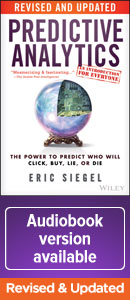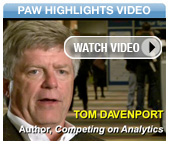Conference Day 1: Monday, March 17, 2014
8:00-8:45 Room: Grand Assembly
Registration & Networking Breakfast
9:00-9:05am • Room: Golden Gate A
Conference Chair Welcome
8:50-9:10am • Room: Golden Gate A

Diamond Sponsor Presentation
Predictive Analytics for a Broad Spectrum of Users
According to a report published by Loudhouse Consultancy*, nearly 95% of organizations report an increase in the volume of data they are dealing with over the last 12 months and 75% of organizations say it is difficult to reap the benefits of predictive analytics without specialized employees. Learn how SAP solutions help bring greater insight to today's companies by extending the power of predictive analytics – from data scientists to data analysts and end users of predictive applications for CRM, risk, fraud, and operations. Marco will also present a live demo using the example of a smart vending machine, so you can get a look at what the future will hold.
*"Predicting the Future of Predictive Analytics" [PDF], December 2013, Loudhouse
9:10-10:00am • Room: Golden Gate A
Keynote
The Prediction Effect, the Data Effect, and the Persuasion Effect
What are the underlying principles that make predictive analytics effective? Why is data predictive, why is imperfect prediction valuable, and what type of prediction succeeds to persuade? You have heard of the butterfly, Doppler, and placebo effects. In this session, PAW founder Eric Siegel covers the Prediction, Data, and Persuasion Effects. Each of these Effects encompasses the fun part of science and technology: an intuitive hook that reveals how it works and why it succeeds.
Attendee's receive a free copy of the related book by Eric Siegel, Predictive Analytics: The Power to Predict Who Will Click, Buy, Lie, or Die.
[ Top of this page ] [ Agenda overview ]
10:00-10:30am • Room: Salon 8/9
Exhibits & Morning Coffee Break
10:30-11:15am • Room: Salon 5/6
 Track 1: Large-Scale Continuous Learning
Track 1: Large-Scale Continuous Learning
Case Study: eBay
Importance of Speed and Relevance to eBay and Our Big Data Strategies
eBay runs at the pace of its customers -- continuous and 24x7 -- reaching billions globally. Data is a mirror reflection of our customers and their experiences both on eBay and from other social/external sites. The faster we can proactively react to happenings that occur globally with adequate context and understanding, the better eBay can provide more relevant and meaningful experiences and services to its customers and partners. eBay has implemented technologies to extend our speed of decision making and automated analytics across all our personas. In this presentation, eBay outlines the business opportunity.
10:30-11:15am • Room: Golden Gate A
 Track 2: Persuasion Modeling (aka Uplift Modeling)
Track 2: Persuasion Modeling (aka Uplift Modeling)
Case Study: Obama for America
Pinpointing the Persuadables: Convincing the Right Customers and the Right Voters
Marketing, political campaigning, and healthcare have one major thing in common: millions of per-person treatment decisions must be selected in order to drive positive outcomes. Prior to President Obama's reelection campaign, standard practices for persuading voters—that is, changing their minds—were unscientific and driven by long-standing assumptions and hunches. This mirrors outreach efforts by other companies and organizations, which know that a certain percentage of their marketing efforts will inevitably be wasted on people who are not going to be receptive to it. Daniel Porter of BlueLabs, who served as the Director of Statistical Modeling for the Obama Campaign, will discuss his experience using the results from a large-scale randomized, controlled experiment to target persuadable voters for the Obama Campaign, as well as ways these cutting edge statistical modeling techniques can be applied to influencing behavior in realms ranging from health outcomes to customer retention.
[ Top of this page ] [ Agenda overview ]
11:20am-12:05pm • Room: Salon 5/6
 Track 1: Social Media Analysis
Track 1: Social Media Analysis
Think Link! Network Insights with No Programming Skills
Networks are everywhere but collecting, analyzing, visualizing, and gaining insights into connected structures can require advanced technical skills. This session presents a free, easy-to-use tool for network analysis that builds on the familiar Excel spreadsheet called NodeXL. If you can make a pie chart, you can get insights into networks. The tool makes it easy to collect data from a range of social media (Twitter, Facebook, YouTube, etc.). Quickly create visualizations and reports on the shape of connected groups. Identify the key people, groups and topics in a community. Network analysis can reveal the hidden structures in streams of interactions.
11:20am-12:05pm • Room: Golden Gate A
 Track 2: Marketing
Track 2: Marketing
Case Study: Sears Holdings
Predictive Design of Marketing Campaigns
This talk presents a case study in designing a marketing campaign through the joint use of predictive analytics and optimization techniques. Statistical modeling is used to create segments of customers while optimization techniques are employed to tailor offers to the characteristics of the segment. Validation results and lessons learned will be presented.
Robin Glinton, Director of Data Sciences, for Data Sciences Labs, Information Analytics and Innovation, Sears Holdings
[ Top of this page ] [ Agenda overview ]
12:05–1:15pm • Room: Salon 8/9
Lunch
12:25–1:15pm • Room: Salon 5/6
 Lunch & Learn
Lunch & Learn
Predictive Analytics That Deliver Deeper Customer Insights in Hours, Not Weeks
Determining similarities in key customers and understanding how location impacts the success of your business can deliver a distinct competitive edge to any organization. This session will demonstrate how several organizations are utilizing Alteryx to combine spatial analysis and R-based statistical and predictive analytics into their business processes to better understand these similarities. We will showcase how Alteryx's intuitive drag and drop workflow environment enables analyst to perform data blending and advanced analytics to uncover purchasing patterns, determine store groupings, and improve sales forecasting. All of which results in improving customer understanding and increasing sales.
Jimmy Garrett, Solutions Engineer, Alteryx
 1:15-1:30pm • Room: Golden Gate A
1:15-1:30pm • Room: Golden Gate A
Sponsor Presentation
Think Fast, Think Small: Delivering the Power of Big Data Analytics for Everyday Tasks
Now that big data and predictive analytics are established as strategic tools, how do we deliver this power to the broadest set of business users, to support everyday analytical tasks? This is a critical question forward-looking organization face as they look to leverage data for competitive advantage and drive innovation both at the leadership and departmental level. As we'll discuss, the key to making advanced analytics accessible by everyday users is to "think fast, think small." Inspired by self-service apps and the "small data" movement, we'll highlight key design principles and approaches. Finally we'll recap characteristics to look for when selecting predictive analytics tools for business analysts.
1:30-2:15pm • Room: Golden Gate A
Keynote
Achieving the Previously Impossible: Collapsing Data Silos with Big Data Architecture & Technologies
It took root at Google, Facebook and other Internet companies, and Big Data technologies are now rapidly branching into conventional enterprises. Complex analytics involving numerous disparate data silos has been historically very challenging or impossible. Big Data technologies now enable the concept of an integrated enterprise-wide data architecture, enabling analytics on the difficult use cases. In addition, significant cost reductions and performance improvements are seen by enterprises adopting these techniques and tools. This presentation examines the concept of an enterprise data hub, an integrated architecture and approaches to successful implementation.
[ Top of this page ] [ Agenda overview ]
2:15-2:30pm • Room: Golden Gate A
Vendor Elevator Pitches




 Track 1: Media Placement
Track 1: Media PlacementCase Study: Expedia
Measuring the Value of TV Ads Online
How does a well-known brand like Expedia measure the impact of TV ads? Unlike online advertisement, which can be tracked, the impact of TV ads is often left to guesswork or wishful thinking. In this session we review several creative ways to measure impact of each TV ad, analyze the "halo" effect and model the ROI of TV ads.
2:30-2:50pm • Room: Golden Gate A
 Track 2: Web Optimization
Track 2: Web Optimization
Google Analytics Intelligence
Google Analytics continues to grow one of the largest and most heterogenous datasets in the analytics world. In this talk we present some of our thinking about how to bring more predictive intelligence to Google Analytics at Internet scale, and to millions of businesses around the world.
 Track 1: Analytics Staff & Project Management
Track 1: Analytics Staff & Project Management
The Top 3 Strategies for Setting Up an Analytics Center of Excellence
Are you an analytics or a business leader interested in turning your analytics organization into a center of excellence? Whether starting a group from scratch or re-organizing/augmenting an existing team, these 3 questions can't be ignored:
- How to set up the organizational structure
- How to lay out the analytics agenda
- What should the team make up look like?
In this session, Piyanka Jain of Aryng -- a management consulting company focused on Analytics and author of the upcoming Wiley book, Behind Every Good Decision -- walks you through a process on how to do it right.
2:55-3:15pm • Room: Golden Gate A
 Track 2: Online Ad Placement
Track 2: Online Ad PlacementCase Study: Compass Labs
Using Predictive Analytics to Improve ROI in Online Advertising
This talk focuses on the use of data science to improve advertising performance on social media, such as Facebook and Twitter. Attend and hear case studies on the use of analytical methods to identify the optimal audience targeting and then combine that with an optimal bidding strategy to maximize the ROI on social media advertising for a leading credit card company.
Exhibits & Afternoon Break
 Track 1: Price Optimization & Marketing
Track 1: Price Optimization & Marketing
Case Study: Brisconnections Ops (Australia toll roads)
Targeting Pre-Opening Marketing Actions: How Predictive Analytics Helped a Toll Road Operator Reduce Marketing Risk
How does a toll road operator de-risk pre-opening marketing decisions for new infrastructure? Which commuters are most likely to become toll road customers and how much are they willing to pay? Facing these questions prior to the opening of AirportLinkM7 in Brisbane, BrisConnections Operations Pty Limited had a hypothesis that journey need/mission, and value of time were key factors driving a willingness to choose toll roads over non-tolled alternatives. Deloitte engaged data sharing and predictive analytics to reduce marketing and pricing risk, and help secure operational funding to support an extended toll free period and toll price ramp-up for AirportLInkM7.
3:55-4:40pm • Room: Golden Gate A
 Track 2: Media Placement
Track 2: Media Placement
Case Study: Axis Bank & Kotak Mahindra Bank
Convergence Modeling Across Paid, Owned and Earned Media for Measuring Business Effectiveness
With media ROI being questioned, marketers must measure advertising impact on tangible business revenue, rather than brand alone. Marketing Mix Models do not suffice because not all media affect revenue directly, nor are media vehicles independent. We built POEM, Paid-Owned-Earned Model, using Structural Equation Modeling to capture inter-relationships across media platforms. POEM quantifies both direct and indirect influencers on measured KPIs, and even incorporates softer ˜human" attributes, like consumer experience, using latent variables. POEM caused a paradigm shift in media investments for two Indian banking clients, Axis Bank and Kotak Mahindra Bank, and serves as their principal marketing decision-support system.
Aarti Bharadwaj, Vice President, Analytics Centre of Excellence, Starcom Mediavest Group, India
[ Top of this page ] [ Agenda overview ]
4:45pm–5:30pm • Room: Salon 5/6
 Track 1: Collections
Track 1: CollectionsCase Study: Paychex
Collections: Every Penny Counts
Considering the current economy, most businesses operate under the philosophy of "every penny counts". For years, the Paychex Collections department refined processes to improve both efficiency and effectiveness, beating budgeted write-offs year in and year out. However, as the economy worsened, budgets became tighter and the collections pressure was on. The Predictive Analytics team at Paychex was brought in to analyze the situation, ultimately creating a logistic model, dubbed MARCO. MARCO prioritized clients, allowing Collections to ignore a significant portion of the transactions while sacrificing only a sliver of the dollars recovered.
4:45–5:30pm • Room: Golden Gate A
 Track 2: Salesforce Optimization
Track 2: Salesforce OptimizationCase Study: Hewlett-Packard
Early Warning System for Deal Abandonment
Despite every possible effort to bolster sales, many organizations nowadays suffer from static or declining revenue. An Early Warning System (EWS) can predict potential opportunities with high risk of abandonment in time, and the suggested corrective actions can bring millions of dollars. EWS is a non-traditional approach of problem solving, is easy to implement, and highly cost effective. EWS has been developed using advanced text mining, decision tree, data imputation and regression techniques. EWS helped HP CMS determine that 20% of its closed sales pipeline worth billion dollars was getting abandoned annually and added a lot of value.
Suresh Arumugam, Analytics Consultant, Hewlett Packard
Aasif Mohammad Kidwai, Business Analyst, Hewlett Packard
Chiranjiv Roy, Analytics Consultant, Global Analytics, Hewlett Packard
[ Top of this page ] [ Agenda overview ]
Networking Reception
7:00-10:00pm • Room: Salon 5/6
Bay Area useR Group Meeting
7:00-10:00pm • Room: Golden Gate A
Bay Area SAS Users Group Meeting
Conference Day 2: Tuesday, March 18, 2014
Registration & Networking Breakfast
8:45-8:50am • Room: Golden Gate A
Conference Chair Welcome Remarks
8:50-9:10am • Room: Golden Gate A
Diamond Sponsor Presentation
[ Top of this page ] [ Agenda overview ]
9:10-10:00am • Room: Golden Gate A
Keynote
Blackjack Analytics: A Surprising Teacher from Which All Businesses Can Learn
Analysis in Blackjack (the most widely played casino game in the world) makes this game beatable. There are parallels which carry over to the application of analytics in the corporate world. Session will cover relevant case studies at Orbitz as well as general lessons from BJ that we can leverage in our work and lives. Chopra will also demystify card counting for the audience -- the goal is for the session to be fun as well as informative!
10:00-10:30am • Room: Salon 8/9
Exhibits & Morning Coffee Break
10:30-10:50am • Room: Salon 5/6
 Track 1: Sports Analytics
Track 1: Sports Analytics Why Steve Nash is My Nemesis: Finding the Missing Data
Steve Nash is one of the players who has perplexed draft analysts for years. His college performance does not seem to point to his future on court greatness in the NBA. In looking to find potential solutions to this problem, I looked to find the data that was missing from the model, and found some unique potential answers in unexpected places.
10:30-11:15am • Room: Golden Gate A
 Track 2: Data Cleansing
Track 2: Data Cleansing
Data Preparation from the Trenches: 4 Approaches to Deriving Attributes
The data preparation stage of predictive modeling is often viewed and the most time-consuming, with experts describing the time expended in this stage ranging from 50% to even 90%. One of the problems modelers encounter with data preparation is that the needs and solutions for data cleaning and creation of new variables (features) changes with each project or sometimes even within a single project because there is no theory that tells us what to do. This session focuses on four key principles used in the creation of derived variables. Examples from actual modeling projects will illustrate the principles.
10:55-11:15am • Room: Salon 5/6
 Track 1: Industry Research
Track 1: Industry Research
Predictive Analytics in the Cloud: Use Cases and Trends
Predictive analytics are the most effective way to put Big Data to work. Cloud technologies both deliver new data sources and provide a scalable, pervasive platform for analytics. The intersection is creating new opportunities for value and new ways to exploit Big Data. This session covers recent research on how companies are thinking about this space and how that thinking is evolving as these markets explode in importance. Based on research conducted in 2011 and 2013, trends in the importance of key use cases as well as the role of Big Data will be discussed.
[ Top of this page ] [ Agenda overview ]
11:20–11:40am • Room: Salon 5/6
 Track 1: Industry Research
Track 1: Industry Research
What's the Difference Between a Data Scientist and an Analyst: Some Findings from a Recent Research Study
Today's Data Scientist is more than just a re-branded version of yesterday's "Business Analyst". Recent research shows Data Scientists are more likely to work on different types of business problems, using different types of data than traditional analysts, and are much more focused on pursuing a unified view of the customer. In addition, Data Science teams have fundamentally different relationships with executive leaders. As one focus group participant told us, "Executives today are struggling to re-organize their businesses around data-driven decision making, and we need to help them get there." No matter your role, our findings will surprise you.
11:20am–12:05pm • Room: Golden Gate A
 Track 2: Workforce Analytics - Retention
Track 2: Workforce Analytics - Retention Case Study: A Major Financial Services Call Center
A Data Science Approach to Reduce Call Center Attrition
This case study presentation by Talent Analytics Chief Scientist Pasha Roberts provides details on how a major financial services call center used data science to significantly reduce attrition by over 30%, yielding a multi-million dollar savings.
Attend and leave this session with a concrete understanding of:
- The business value of talent optimization, showing how correlating "raw talent" to attrition can yield unprecedented results
- The analytics approach and models used to reduce attrition.
11:45am–12:05pm • Room: Salon 5/6
 Track 1: Energy Management
Track 1: Energy Management
Case Study: UC San Diego
Towards an Intelligent Smart Grid
As demand for cost-effective energy and resource management continues to grow, intelligent automated building solutions are necessary to reduce energy consumption, increase alternative energy sources and reduce operational costs. UC San Diego's 1200-acre campus provides a forward-thinking, innovation engine to reduce the overall carbon footprint of its 45 MW peak load Smart Grid. In collaborations with the commercial sector, PACE is developing a scalable temporal predictive analytics tool for large-scale, real-time energy management.
[ Top of this page ] [ Agenda overview ]
12:05–1:15pm • Room: Salon 8/9
Lunch
 12:25–1:15pm • Room: Salon 5/6
12:25–1:15pm • Room: Salon 5/6
Lunch & Learn
Operationalizing Real-Time Marketing with Predictive Consumer Insights
Randy Browning, CEO of Blab, Inc., a pioneer in predictive social intelligence, will demonstrate how brands can gain competitive market advantage with real-time predictive insights. Mr. Browning will demonstrate through use cases, how brands can leverage the consumer firehose of unstructured consumer data to gain predictive insights, cross channel visibility, contextual relevance, conversation and content awareness. You'll discover how to add value to customer interactions, increase brand relevance, and support spontaneity and dialogue to engage and delight your customers.
1:15–2:00pm • Room: Golden Gate A
Special Plenary Session
The Peril of Vast Search (and How Target Shuffling Can Save Science)
It's always possible to get lucky (or unlucky). When you mine data and find something, is it real, or chance? The central question in statistics is "How likely could this result have occurred by chance?" Ancient geniuses devised formulas to answer this question for multiple special-case scenarios. Yet, their calculus only applies to quaint, handmade analyses, where only a few hypotheses are considered. However, modern predictive analytic algorithms are hypothesis-generating machines, capable of testing millions of "ideas". The best result stumbled upon in its vast search has a much greater chance of being spurious. Such overfit is particularly dangerous, as it leads one to rely on a model molded to the data noise as well as signal, which usually is worse on new data than no model at all. The problem is so widespread that it is the chief reason for a crisis in experimental science, where most journal results have been discovered to resist replication; that is, to be wrong!
The good news is an antidote exists! Dr. Elder will explain the simple breakthrough solution -- still rarely employed, though newly being re-discovered in leading fields. John will illustrate how to use the resampling method he calls "Target Shuffling" in multiple learning scenarios, from model fitting to data exploration, showing how it calibrates results so they are reliable - essentially providing an honest "placebo effect" against which to test a new treatment (finding).
Bottom line: Honest Data Science can save Experimental Science!
 2:00-2:15pm • Room: Golden Gate A
2:00-2:15pm • Room: Golden Gate A
Sponsor Presentation
Big Data Analytics - No programming Required
Today it's common practice to collect data, all kinds of data, vast amounts of data. So much data, it's called Big Data. But until you set in motion a plan for managing your data and uncovering insights, the data doesn't have any real value to your company. But getting to those insights requires specialized skills and often arcane knowledge. The combination of programming skills, business context and IT knowledge is needed to fuel a collaborative team approach - data scientists, line of business managers and IT all need to work together.
2:15–3:00pm • Room: Golden Gate A
Expert Panel
Necessary Skills of the Quant Across Sectors
What makes a quant a true rockstar? What kind of soft skills, what kind of tech skills and background, and what portfolio of experience? With the organizational process behind predictive analytics - across business applications such as fraud and marketing - something of an art form, the requisite skills of key analytics staff are multidimensional and often hard to nail down. This expert panel will grab a hammer and start defining exactly what's needed in this very particular workforce.
Panelists: Dean Abbott, President, Abbott Analytics, Inc.
Greta Roberts, CEO, Talent Analytics, Corp.
Mazhar Hussain, Global Leader, Big Data & Analytics, HP
Exhibits & Afternoon Break
3:30–4:15pm • Room: Salon 5/6
 Track 1: Healthcare Analytics
Track 1: Healthcare Analytics
Case Study: DPS Health
Predicting Ongoing Engagement with an Online Health Behavior Change Program
This session presents a case study of predictive analytics applied to users of a health behavior change program. DPS Health's VLM solution is a year-long digital behavior change intervention that engages obese individuals in an integrated e-Learning, behavioral management and coaching intervention. DPS Health implemented a modified conditional hazard model to assess demographic and application usage patterns related to ongoing application usage. The results were used to predict future engagement of current application users as well as guide future product development. This session describes the model, DPS Health's case study of its use and the resulting benefits.
3:30–4:15pm • Room: Golden Gate A
 Track 2: Behavioral Modeling
Track 2: Behavioral Modeling
Case Study: Wells Fargo
Using Time-Series Clustering to Understand Customer Behavior
It wasn't so long ago that point-to-point was the only tool available to understand customer behavior at any large scale. In this presentation we will cover the analytical methodologies used in Wells Fargo's "Big Data" environment to segment customers into time-series patterns of behavior. We will explore the filtering and discretization techniques used to pre-process the data, and tools for identifying patterns in the big data environment. We also address the advantages and disadvantages of our methodology, what we learned along the way, and how data visualization helped bring the results to life and make them relevant to the business.
Evelyn Lawson, Lead Statistician, Wells Fargo
[ Top of this page ] [ Agenda overview ]
4:20-5:05pm • Room: Salon 5/6
 Track 1: Social Sciences
Track 1: Social Sciences
Who's Bigger? Where Historical Figures Really Rank
As with business applications of predictive analytics, the social sciences also seek to score and rank individuals -- in this case, historical figures rather than consumers.
Ground has newly been broken by the speaker (and his coauthor of a new book with the same title as this session) developing an algorithmically-constructing quantitative measures of historical reputation. Who is more historically significant: Beethoven or Elvis? Washington or Lincoln? Newton or Einstein?
By exploiting large-scale data from several sources, these innovators have developed a factor analysis-based ranking method which measures the relative importance of all the people described in Wikipedia in a rigorous way. They have validated our measure against published rankings of historical figures, demonstrating that the rankings are generally better than those of human experts.
This measure delivers the power to rigorously investigate several previously difficult-to-formalize questions, such as:
- Are the right people in the history books?
- How well do halls of fame correctly identify the most significant individuals?
- Are men and women treated equally in Wikipedia?
In this talk, Dr. Ward discusses the methodology for ranking historical figures, with assessment results and applications. The rankings are available for inspection at www.whoisbigger.com.
4:20-5:05pm • Room: Golden Gate A
 Track 2:Insurance
Track 2:Insurance
Case Study: A Top 3 P&C Provider in Japan
Digital Lead Optimization in Insurance
In this session, we present the development and implementation of a real-time digital lead aggregator optimization engine for a major global P&C carrier. We cover the technical difficulties and constraints the team faced and the solutions we developed. Moreover, we discuss how we achieved alignment across the supply and demand side of the aggregator/lead ecosystem. Result: The insurance carrier was able to reduce cost by 40% while maintaining 90% of conversion by eliminating, in real time, unproductive leads. The online lead suppliers were able to expand the available universe for selection, which lead to greater overall spending.
Yanni Kotziagkiaouridis, Vice President, Analytics Strategy Practice Lead Insurance and Wealth Management Analytics, Merkle
[ Top of this page ] [ Agenda overview ]
































